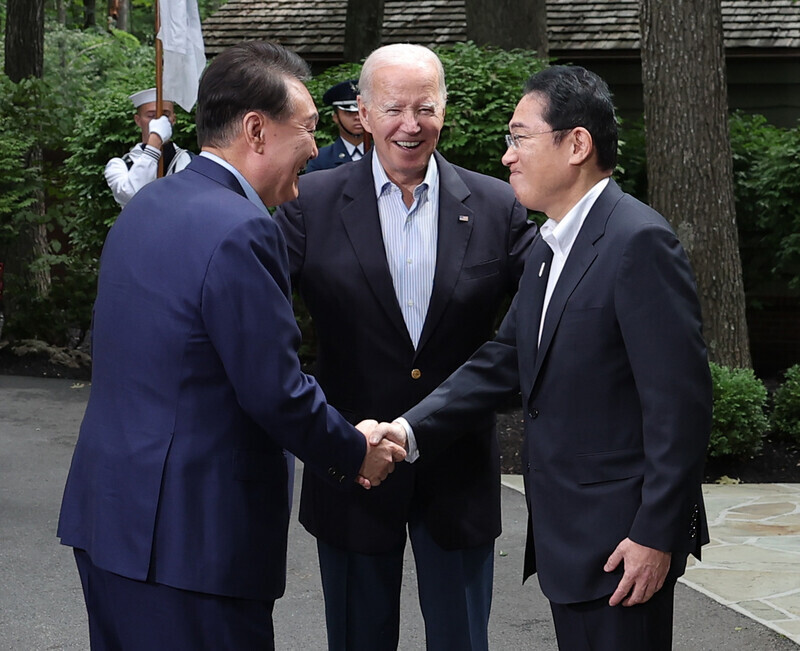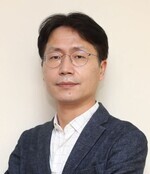hankyoreh
Links to other country sites 다른 나라 사이트 링크
[Correspondent’s column] What more can Yoon offer Japan?


Strange things have been happening one after the other since Aug. 15, making me dizzy at the absurdity of these sorts of events taking place in such quick succession. That day, President Yoon Suk-yeol called Japan a “partner who share[s] universal values and pursue[s] common interests” with South Korea during his National Liberation Day speech. On the same day, Japanese Prime Minister Fumio Kishida sent ritual offerings to the Yasukuni Shrine, where Class-A war criminals are enshrined.
Three days later, the leaders of South Korea, the US and Japan met and affirmed their resolve to upgrade trilateral relations between the three countries to the level of a “quasi-military alliance.” On Aug. 24, Japan started dumping radioactive wastewater into the ocean with the support of the South Korean government.
Soon, controversy erupted over the busts of Gen. Hong Beom-do that stand at the Korea Military Academy and the Ministry of National Defense compound. Friday, Sept. 1, is the centennial of the Kanto Massacre, during which thousands of Koreans were killed simply for being Korean.
Normally, the past two weeks should have been a time for Koreans to meditate on the significance of national independence, take heed against policies of aggression, and commemorate the tragic deaths of our compatriots. In that respect, one couldn’t help but notice the sense that our country was getting dragged into something unsavory during these two weeks that were well out of the ordinary.
At the heart of this chain of events seems to be the promise made by the leaders of South Korea, the US and Japan in their joint statement at Camp David to carry out joint military exercises in earnest. The governments of South Korea and the US have stressed that this does not amount to a trilateral military alliance, which they purportedly have no intention of pursuing. But considering that military cooperation among the three countries has steadily progressed until reaching its current point, there seems to be ample room for it to advance further.
But how? Would establishing a basis for the dispatch of Japanese troops to the Korean Peninsula be one way in which military cooperation among South Korea, the US and Japan might be expanded? Earlier, Japan declared its acquisition of enemy base strike capabilities. At the Camp David summit, Seoul, Washington, and Tokyo pledged to consult one another in the event of crises and conduct full-scale joint military exercises. This is something countries do to prepare for actual warfare. Joint military exercises involving ground, sea, and air forces may add to the chances of the Japan Self-Defense Forces entering the Korean Peninsula. This type of joint drill is on a different level from joint naval exercises conducted in international waters to secure safe seaways or eradicate pirates.
Historically, Japan rationalized the dispatch of its troops to the Korean Peninsula with all kinds of excuses, securing bridgeheads for invasion. During the Imjin Wars, Japan asked to borrow a path so it could invade the Ming dynasty. In 1882, immediately after the Imo Incident, Japan used the Treaty of Chemulpo to justify the stationing of security forces at the Japanese legation. Through the Tientsin Convention it signed with the Qing Empire after the Gapsin Revolution in 1884, Japan made it so that the two countries would notify the other when dispatching troops to Korea. This served as a pretext for Japan to send its forces to Korea during the Donghak Peasant Revolution in 1894, eventually giving rise to the First Sino-Japanese War. After growing to regard the Korean Peninsula as its home, Japanese forces took over Hanseong (now Seoul) during the Russo-Japanese War of 1904 even though the Empire of Korea declared its neutrality.
One might ask how such things could happen again in the 21st century. But there are many other ways to exploit and sacrifice another country other than colonization. Powerful countries started deciding the fate of the Korean Peninsula among themselves roughly 140 years ago, and the Korean people are still bound by those shackles.
In 2015, former US Secretary of State Wendy Sherman, who retired from her post this past July, remarked, “It’s not hard for a political leader anywhere to earn cheap applause by vilifying a former enemy,” expressing through snooty language Washington’s frustration regarding South Korea’s unwillingness to bury the hatchet and make up with Japan as the US desires.
Now, the US regards Yoon as a brave leader who is taking a stand against the public’s narrow-mindedness. But a leader of a democracy receiving praise from outsiders for what he did while being criticized by his constituents for the same thing seems nothing short of unconscionable.
Please direct questions or comments to [english@hani.co.kr]

Editorial・opinion
![[Column] Samsung’s ‘lost decade’ and Lee Jae-yong’s mismatched chopsticks [Column] Samsung’s ‘lost decade’ and Lee Jae-yong’s mismatched chopsticks](https://flexible.img.hani.co.kr/flexible/normal/500/300/imgdb/original/2024/0512/3017154788490114.jpg) [Column] Samsung’s ‘lost decade’ and Lee Jae-yong’s mismatched chopsticks
[Column] Samsung’s ‘lost decade’ and Lee Jae-yong’s mismatched chopsticks![[Correspondent’s column] The real reason the US is worried about Chinese ‘overcapacity’ [Correspondent’s column] The real reason the US is worried about Chinese ‘overcapacity’](https://flexible.img.hani.co.kr/flexible/normal/500/300/imgdb/original/2024/0510/5217153290112576.jpg) [Correspondent’s column] The real reason the US is worried about Chinese ‘overcapacity’
[Correspondent’s column] The real reason the US is worried about Chinese ‘overcapacity’- [Editorial] Yoon’s gesture at communication only highlights his reluctance to change
- [Editorial] Perilous stakes of Trump’s rhetoric around US troop pullout from Korea
- [Guest essay] Preventing Korean Peninsula from becoming front line of new cold war
- [Column] The state is back — but is it in business?
- [Column] Life on our Trisolaris
- [Editorial] Penalties for airing allegations against Korea’s first lady endanger free press
- [Editorial] Yoon must halt procurement of SM-3 interceptor missiles
- [Guest essay] Maybe Korea’s rapid population decline is an opportunity, not a crisis
Most viewed articles
- 1Seoul’s plan to adopt SM-3 missiles is like wanting a sledgehammer to catch a fly
- 2[Column] Samsung’s ‘lost decade’ and Lee Jae-yong’s mismatched chopsticks
- 3[Correspondent’s column] The real reason the US is worried about Chinese ‘overcapacity’
- 4Yoon rejects calls for special counsel probes into Marine’s death, first lady in long-awaited presse
- 5S. Korea “monitoring developments” after report of secret Chinese police station in Seoul
- 6Japan says its directives were aimed at increasing Line’s security, not pushing Naver buyout
- 7Korea poised to overtake Taiwan as world’s No. 2 chip producer by 2032
- 8Yoon voices ‘trust’ in Japanese counterpart, says alliance with US won’t change
- 9US expert says THAAD can’t distinguish between real and decoy warheads
- 1046% of cases of violence against women in Korea perpetrated by intimate partner, study finds